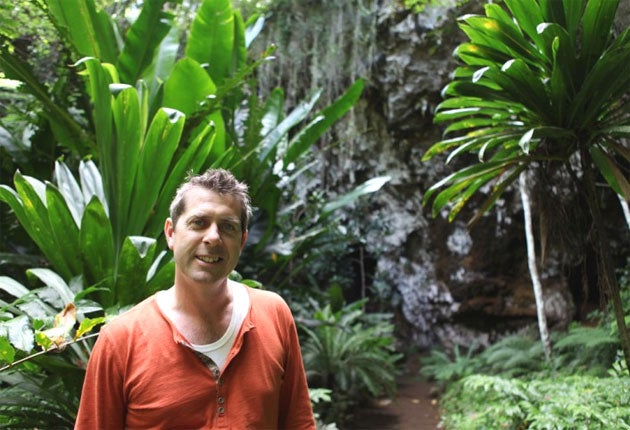Your support helps us to tell the story
From reproductive rights to climate change to Big Tech, The Independent is on the ground when the story is developing. Whether it's investigating the financials of Elon Musk's pro-Trump PAC or producing our latest documentary, 'The A Word', which shines a light on the American women fighting for reproductive rights, we know how important it is to parse out the facts from the messaging.
At such a critical moment in US history, we need reporters on the ground. Your donation allows us to keep sending journalists to speak to both sides of the story.
The Independent is trusted by Americans across the entire political spectrum. And unlike many other quality news outlets, we choose not to lock Americans out of our reporting and analysis with paywalls. We believe quality journalism should be available to everyone, paid for by those who can afford it.
Your support makes all the difference.A British geology professor is set to become the David Blaine of the science world, after agreeing to be locked in an airtight chamber for 48 hours with only some specially selected plants for company.
Iain Stewart, professor of geoscience at Plymouth University and television presenter, hopes the plants will provide the oxygen required to keep him alive. He is carrying out the experiment at the Eden Project in Cornwall. "That box, this experiment, is the planet," he told The Independent. "People don't think of plants as our life support system without which we wouldn't be able to function and life wouldn't be able to function."
Oxygen levels in the scientist's container will be reduced to around 10-12 per cent, just over than half that of the air around us. It is this oxygen shortage that typically leads to altitude sickness in some people.
The first few hours of the experiment, which was due to begin last night, will be conducted in the dark. Scientists will initially take readings of Professor Stewart's body, as well as conditions in the chamber, before turning the lights on so the plants can begin photosynthesising.
"This experiment has never been done before with a human – it seems a fascinating challenge to see if plants really could keep a person alive," he said. "I cannot think of a more powerful way of driving home to the viewer the importance of photosynthesis."
Inside the chamber, the Professor's and the plants' health will be in delicate equilibrium. If carbon dioxide levels fall too low, and the plants cannot photosynthesise, he will be required to exercise in order to increase the amount of CO2, which the plants need to produce oxygen. But if carbon dioxide levels are too high, it will be damaging to the plants' health and his own.
"I will be dependent on the oxygen produced by the plants," he said. "But the plants are dependent on me too. If I don't perform they will die."
Months of careful preparation has gone into setting up the experiment, including selecting the most appropriate plants, which will include a mix of big-leaved banana plants as well as sweetcorn (maize) and tropical herbs.
In common with the American illusionist David Blaine, who spent 44 days in a glass box beside London's Tower Bridge in 2003, Professor Stewart will be on display to the public at the Eden Project over the weekend. The stunt will form part of a new BBC series called How Plants Made the World.
"I think that will be the really worst bit," he said. "While the Eden Centre's open people can come in, to within a metre of a glass box. Some of my students have said they're going to come down, press their noses against the glass and start giving me jip.
"But I'm more worried about spending 48 hours by myself. How often do you get to do that? I might end up hating myself. I'm so used to being with other people. But it should be fun."
The chamber is eight metres long and two-and-a-half metres high. As well as the plants, there is a hammock for Professor Stewart to sleep in, an exercise bike, a chemical toilet and a laptop computer. He will send the occasional tweet while inside.
The number of plants would have been higher, but scientists overseeing the experiment insisted on a clear exit, in case of an emergency. "There is a certain irony," Professor Stewart said. "If it weren't for the exit way, there would be more plants in there. If there was no exit way, I probably wouldn't need an exit way."
But it is not his own health he is most worried about. "The idea of being on the sharp end of a rough scientific experiment is quite unnerving," he said. "But if I go in and start having adverse reactions straight away, it will all have been for nothing. That's the thing I'm most nervous about."

Join our commenting forum
Join thought-provoking conversations, follow other Independent readers and see their replies
Comments